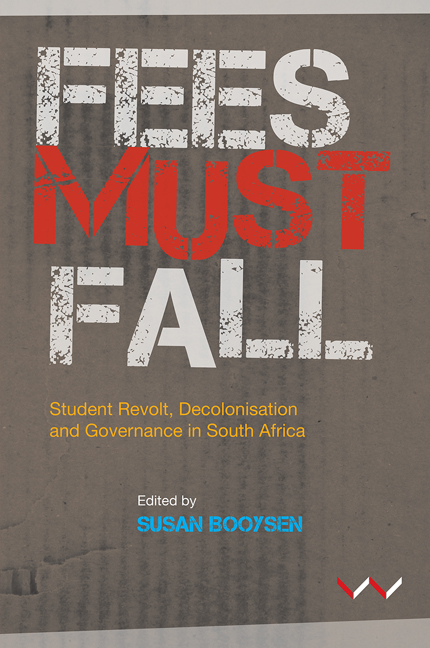Book contents
- Frontmatter
- Contents
- Acknowledgements
- Preface
- Introduction
- PART ONE POWER REDEFINED – ‘WHAT HAPPENED TO GOVERNANCE?’
- PART TWO PRIMARY VOICES – ‘THE ROOTS OF THE REVOLUTION’
- PART THREE THE REVOLT – ‘RISING AGAINST THE LIBERATORS’, SOUTH AFRICA IN AFRICA
- PART FOUR POWER AND CLASS REDEFINED – ‘SIT DOWN AND LISTEN TO US’
- PART FIVE JUSTICE, IDENTITY, FORCE AND RIGHTS – ‘WE CAME FOR THE REFUND’
- APPENDICES
- Contributors
- Index
Preface
Published online by Cambridge University Press: 20 April 2018
- Frontmatter
- Contents
- Acknowledgements
- Preface
- Introduction
- PART ONE POWER REDEFINED – ‘WHAT HAPPENED TO GOVERNANCE?’
- PART TWO PRIMARY VOICES – ‘THE ROOTS OF THE REVOLUTION’
- PART THREE THE REVOLT – ‘RISING AGAINST THE LIBERATORS’, SOUTH AFRICA IN AFRICA
- PART FOUR POWER AND CLASS REDEFINED – ‘SIT DOWN AND LISTEN TO US’
- PART FIVE JUSTICE, IDENTITY, FORCE AND RIGHTS – ‘WE CAME FOR THE REFUND’
- APPENDICES
- Contributors
- Index
Summary
Faced with major and rapid social change, especially when led by students, academic responses vary from diving in holus-bolus to ‘wait and see’, with many points and ways of behaving in-between, which may include participant observation, non-participant observation, activist-scholarship, ‘embedded’ scholarship, disinterested observer, hostile critic, and so on. All are open to challenge, and all hold dangers: a loss of historical or of contemporary perspective; a failure to grasp detail or significance, or to distinguish them in the hurly-burly of the everyday; a failure to capture the lived fabric and significance of a social movement; and of course the ad hominem judgements, aimed at those not in the charmed circle, or those too deeply in the charmed circle, or those too critical, too uncritical, with the wrong politics, the wrong class, the wrong skin colour, and so on.
These academic scuffles are not merely vicious, as Henry Kissinger (among many others) had it, because the stakes are so low in the academy – quite the opposite. Controlling the narrative is key in any struggle, most particularly in the era of tweets and texts, and in particular for youth-led struggles, normally demonised by elders and erstwhile betters. As the #FeesMustFall movement took shape, controlling the narrative was critical given the movement's decision to try to avoid high-profile individual leaders who would normally set and manage the narrative – the ways in which the goals of the struggle are explained to the public, to the core constituency and to its opponents. This book is not an attempt to take control of the narrative. Embarking on a book about the student movement of 2015, we faced many of the dangers above, and only the reader can judge whether the authors negotiated the many pitfalls facing them. The book makes no apologies for making judgements on many aspects of the various #Fallist movements. As Susan Booysen makes clear in the Introduction, this book is a scholarly assessment of a key moment in post-apartheid South Africa. It is not an attempt to snatch away the narrative, to substitute a more moderate alternative, modulated by elders.
- Type
- Chapter
- Information
- Fees Must FallStudent revolt, decolonisation and governance in South Africa, pp. viii - xPublisher: Wits University PressPrint publication year: 2016



